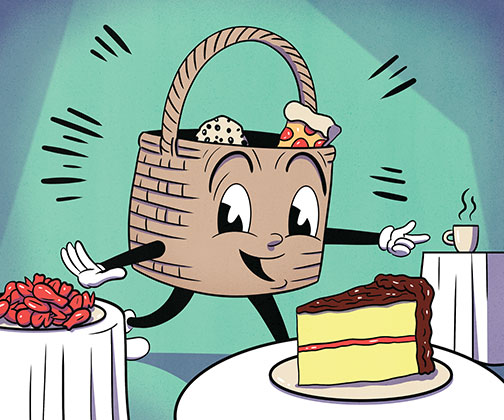Cookies, Wings, and Ramen Noodles — The Tale of a Free-Food Forager
It’s a Tuesday night, and hundreds of students have lined up in Mathey Common Room in anticipation of a perk of Princeton student life: complimentary grilled-cheese sandwiches, part of a weekly study break. If you want to draw a crowd, it’s tough to beat the lure of free food.
But is it possible to live entirely on free food? I rose to the challenge: For three days during midterms week, I would not swipe into a dining hall or purchase food. I assumed that midterms — a period during which study breaks are plentiful — would be the perfect time for a novice Princeton forager.
Eager for advice, I looked for suggestions. Especially valuable is the “freefood” email listserv dedicated to advertising the whereabouts of leftover food on campus. Created in 2011 by Kevin Donahue ’12, it’s open to any student who wants email blasts promoting everything from cupcakes to leftover pizza.
Whispers of secret food abounded. One student said he often had seen coffee and platters of cookies in various humanities buildings throughout the day. A Woodrow Wilson School concentrator noted that the school frequently holds luncheons (translation: unattended platters of food).

With that in mind, I began my quest on Tuesday with a lunchtime foray into Robertson Hall, home to the Wilson School. On the lower level, I was greeted by an assortment of deli sandwiches, fruit salad, and sparkling water. An attendant told me that the food was for an event featuring a conversation with a professor. Pressed for time before my next class, I asked if I could grab a turkey-and-cheese sandwich to go. Take as much as you want, she said.
Tuesday evening was a bonanza: pizza and wings at Frist for a women’s basketball-viewing party, ramen noodles for a senior’s art exhibit in the Lewis Center of the Arts, ice cream sundaes sweetening midterm study sessions — all in one night! As I arrived at each event, I joined students who had come prepared with plates, forks, and Tupperware containers. Helping myself to the food, I thought: If things are this easy, the week should be cake.
And indeed, cake — and cookies — would be all I could find for lunch on Wednesday (like many students, I usually skip breakfast because I’m rushing to class in the morning). Famished after my meager lunch, I got an email from the freefood listserv titled “[Freefood] Chicken & Broccoli and Rice in Murray Dodge Hall.” The meal, courtesy of the Office of Religious Life, converted me into a believer — in the freefood listserv, at least.
Free-food frequenter Walker Carpenter ’17 said he usually could fill his container even after most students have left an event. “Sometimes even after I get what I can grab, there is a lot of food left over,” Carpenter said. “It really makes you think about how much gets thrown away every day.”
Lunch on Thursday was a second-rate sequel to Wednesday: Saltine crackers and a sad-looking chocolate-chip cookie I found on a tray outside Chancellor Green. This left me starving through my three-hour afternoon seminar — but beggars can’t be choosers, and so I was grateful for the comparative-literature professors with sweet tooths.
Dinner was a treat. Both the freefood listserv and a friend referred me to the Real Food Co-op, where students cook in a kitchen in the basement of Edwards Hall. (Guests eat for free!) On the menu: Vegetarian chili, steamed broccoli with cheese, white rice, and chocolate cake with ice cream.
Among food foragers, Danny Weiss ’12, who went a whole year without a meal plan, is legendary. “Food has never been that important to me, and senior year I just couldn’t justify spending so much money on it, so I didn’t spend any on it,” he said. Surviving on leftovers has a moral dimension as well. “Most of my efforts were going to taking the excess that otherwise would have gone to waste,” Weiss said.
That path was not for me, though. After three days, I was ready to pay for regular meals again. I wasn’t exactly starving, but just the thought of eating cookies for lunch everyday was giving me a stomachache.










1 Response
Marlene Morgan ’13
10 Years AgoFree-Food Legacy
I’m writing to correct an error in the On the Campus article on free food in the April 22 issue. Technically, the free food listserv was the idea of Colleen McCullough ’12 and implemented by Kevin Donahue ’12. It’s been a joke among our Princeton group that it’s her most lasting legacy at Princeton!